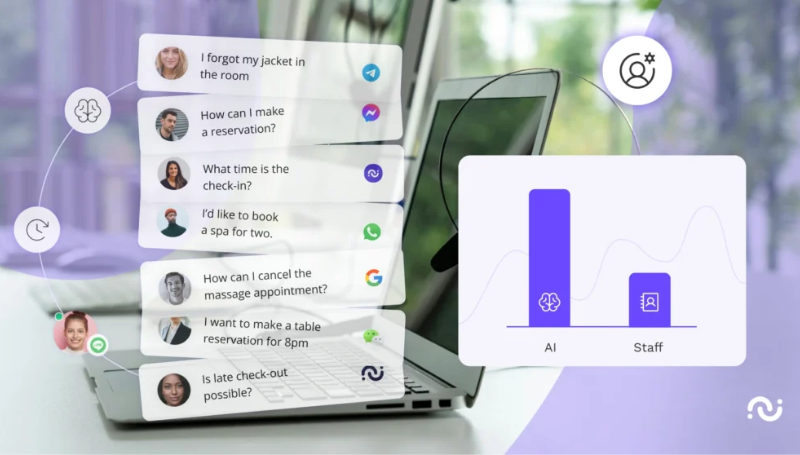




This article offers a useful list of steps on the roadmap to a successful implementation of AI at your hotel. First, we explore key areas that require thoughtful consideration to prepare a solid foundation for introducing new technology at your hotel.
Considerations before implementing AI tools at your hotel
Published in the Advances in Hospitality and Tourism Research journal in 2023, a review of 18 different studies of the impact of artificial intelligence on hospitality employees’ work outcomes identified three key factors that facilitate or prevent AI adoption in hospitality:
- Readiness to use AI
- Knowledge about AI
- Top management support
Keeping them in mind, let’s dive into different areas of preparation.
Proactively address the concerns about AI
The study above analyses research on AI’s impact on staff performance, behaviour and attitude. There is one factor that is considered a significant negative effect, and it is fear of AI taking over the jobs in hospitality. This concern should not be downplayed, and you should put effort into addressing it openly.
At HiJiffy, we work towards developing technology that doesn’t aim to substitute humans in hospitality but instead elevates the role played by staff and supports them in delivering the perfect guest experience. Many AI technology providers share that attitude, but you should always ask about their position, as it can reassure your teams.
AI tools have become more of a necessity in the hospitality industry, which is facing 1.2 million staff shortages, according to the Travel & Tourism Council and European Travel Commission in 2022. It is important to continue to show how these smart technologies are there to support your teams.
Lead with transparency
These three factors above determine how easy or difficult it may be to incorporate new advanced technology at your hotel, so it’s essential to consider them and come to honest conclusions. Do not shy away from challenging questions; instead, engage in open conversations that can contribute to eventual buy-in from the team. Transparency throughout the entire process goes a long way in terms of building trust, not only regarding the new tool but also the leadership.
Set realistic expectations
Take time and ask the technology provider questions to carefully estimate the roadmap of the rollout of the AI solution, from the setup to training to seeing the first results. For example, platforms may require you to train the AI by feeding it information about your hotel. Some of them will need your teams to spend some time populating the data; others will do it automatically for you if you can provide a knowledge base document. The required time and effort levels will be different, and make sure to communicate them clearly to the teams so your staff – as well as you – have realistic expectations.

Map out the stakeholders
Identifying the key people who can influence the success of rolling out a new AI tool at your hotel is a useful exercise. From a broader perspective, you need to understand who are the potential champions and challengers in the following groups:
- Top management/decision-makers at your hotel
- Leaders of the teams that will use the solution (e.g. Reservations, Reception)
- Future everyday users of the solution (e.g. Concierges)
- Customer Success representatives at the technology provider side
Use your insights and experience to identify which specific aspects of the AI tool (features, benefits, price, ease of use, etc.) you should lead with during individual discussions and where you need to prepare solid arguments to address foreseeable concerns and assumptions.
Get your hotel teams involved as soon as you can
“Take risks and embrace change” – taking on such an attitude in strategic leadership positions is easier than in a practical guest-facing environment. When your reception and front-of-house teams are overloaded with work, they may not be as enthusiastic to learn another tool, work with a new system, and do things differently. You’ll have the best understanding of the best moment to get your team involved in the conversation about introducing an AI tool, but try to do it as soon as you are prepared, as time is a precious resource in this process.
Focus on the key benefits from your team’s perspective
Also, when presenting the solution, focus on a specific problem your team is facing, and the AI will now resolve that. For example, if you are implementing HiJiffy’s conversational AI and your team is struggling to stay on top of answering all incoming repetitive questions, highlight that this solution, on average, automatically answers 87% of such queries. There are plenty more benefits coming with this technology, but the more relatable the examples are for your team, the more persuasive they become.
Educate yourself
If you are championing this solution, there will be an expectation among your staff that you may have all the answers. Come prepared for the initial demo with the technology provider, and take time to ask the questions you need. If possible, record the demo to watch it again or show it to your colleagues who are included in the decision-making process. Request links to further resources, such as onboarding videos, a list of features, FAQs, success stories/case studies, or a help centre so that you can do further research or at least have a point of reference when asked questions. The more knowledgeable you are about the solution, the more persuasive you become.
Define the success criteria
Finally, decide what should be considered a successful tool implementation for you. Remember the SMART framework and set your key performance indicators (KPIs). Combining multiple perspectives to have the most meaningful success goal may be a good idea. Using the example of HiJiffy’s conversational AI, you can track guest satisfaction with the CSAT score, operational improvement with the automation rate answering frequently asked questions (FAQs), and impact on revenue and ROI with the number of direct bookings facilitated by the chatbot. Incorporating feedback from your team should also be part of evaluating the success.
Click Here to keep reading - Getting your hotel team on board with AI: Next steps
Contact details

Shaun Sequiera Senior Country Lead UK & Ireland 0044 20 7038 7837 shaun.sequeira@hijiffy.comWeb hijiffy.com



